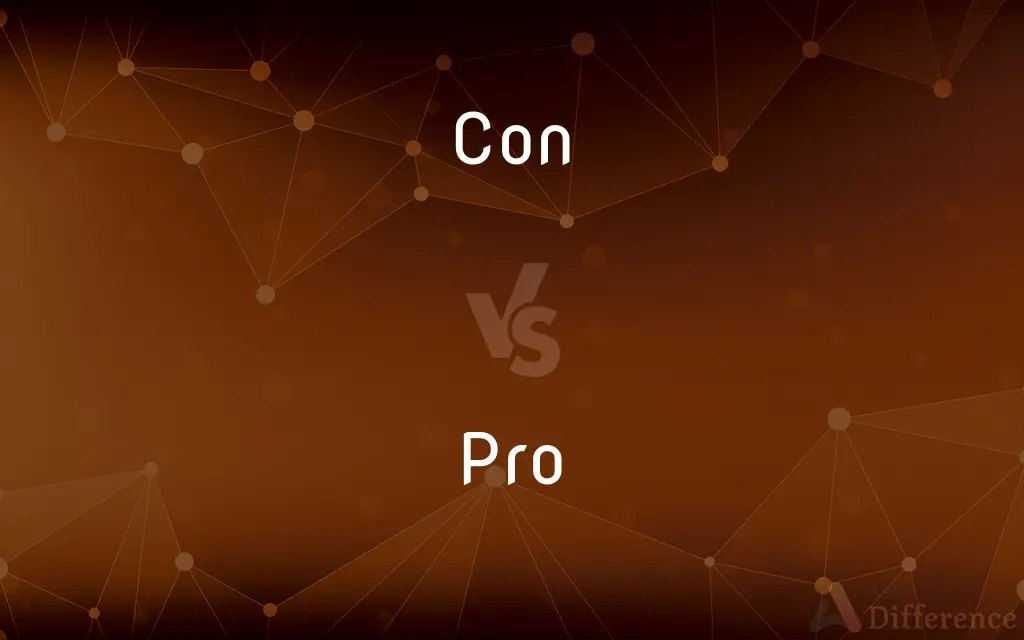Con vs. Pro — What's the Difference?
By Tayyaba Rehman & Urooj Arif — Updated on March 21, 2024
Con represents the negative aspects or arguments against something, while Pro stands for the positive aspects or arguments in favor.

Difference Between Con and Pro
Table of Contents
ADVERTISEMENT
Key Differences
Con refers to the disadvantages, drawbacks, or negative points associated with a decision, idea, or proposal. It embodies the reasons or arguments that highlight the potential downsides or risks. Conversely, Pro represents the advantages, benefits, or positive points that support or justify a choice, idea, or proposal, focusing on the favorable outcomes and strengths.
When weighing a decision or evaluating an idea, listing the cons helps identify potential challenges, risks, or negative implications that need to be considered or mitigated. On the other hand, identifying the pros helps illuminate the value, opportunities, and positive outcomes that the decision or idea could bring about.
In a debate or discussion, participants may align themselves as "pro" or "con" regarding a particular topic, indicating their general stance in favor of or against the subject at hand. This delineation helps structure arguments and clarifies the positions being presented for and against the topic.
The process of evaluating pros and cons is a fundamental decision-making tool, encouraging a comprehensive examination of all aspects of a choice or proposal. It facilitates a balanced view that considers both the positive and negative facets, aiding in more informed and thoughtful decision-making.
Understanding the balance between cons and pros is crucial in various contexts, from personal decision-making to public policy formulation. It ensures that decisions are made with a clear understanding of the potential benefits and drawbacks, leading to more effective and sustainable outcomes.
ADVERTISEMENT
Comparison Chart
Definition
Negative aspects or arguments against.
Positive aspects or arguments in favor.
Purpose
To highlight risks and downsides.
To highlight benefits and advantages.
Usage in Decision-Making
Identifies challenges and potential issues.
Identifies opportunities and strengths.
Role in Debates
Represents a stance against a proposal.
Represents a stance in favor of a proposal.
Impact on Decision-Making
Encourages consideration of risks and mitigation.
Encourages recognition of value and opportunities.
Compare with Definitions
Con
Refers to the drawbacks or negative aspects.
The main con of the plan is its high cost.
Pro
Represents the advantages or positive aspects.
A major pro of the initiative is its potential to create jobs.
Con
Helps assess potential downsides.
We need to consider the cons, such as increased workload.
Pro
Highlights the benefits to be gained.
The pros include improved efficiency and cost savings.
Con
Focuses on identifying and understanding risks.
The cons include potential environmental impacts.
Pro
Emphasizes positive outcomes and strengths.
The pros of adopting this technology are substantial.
Con
Essential for anticipating challenges.
The cons of the new system should be thoroughly evaluated.
Pro
Supports or advocates for a certain idea or proposal.
The pro side highlighted the health benefits of the legislation.
Con
Argues against a certain idea or proposal.
The con side argued that the policy could limit personal freedoms.
Pro
Crucial for understanding benefits.
Evaluating the pros can help justify the investment.
Con
In opposition or disagreement; against
Debated the issue pro and con.
Pro
A professional, especially in sport
A tennis pro
Con
An argument or opinion against something.
Pro
A prostitute.
Con
One who holds an opposing opinion or view.
Pro
An advantage or argument in favour of something
The pros and cons of share ownership
Con
The area or structure on a vessel from which the vessel is conned.
Pro
(of a person or an event) professional
A pro golfer
Con
The position or authority of the officer conning a vessel.
Pro
In favour of
They were pro the virtues of individualism
Con
A swindle.
Pro
In favour of
They were pro the virtues of individualism
Con
A convict.
Pro
An argument or consideration in favor of something
Weighing the pros and cons.
Con
To study, peruse, or examine carefully.
Pro
One who supports a proposal or takes the affirmative side in a debate.
Con
To learn or commit to memory.
Pro
A professional, especially in sports.
Con
To direct the steering or course of (a vessel).
Pro
An expert in a field of endeavor.
Con
To swindle (a victim) by first winning the victim's confidence; dupe
A criminal who conned an unsuspecting tourist out of $5,000.
Pro
In favor; affirmatively
Arguing pro and con.
Con
To cause (someone) to do something by lying, misrepresentation, or trickery
My roommate conned me into washing the dishes.
Pro
Affirmative; supporting
A pro vote.
Con
Of, relating to, or involving a swindle or fraud
A con artist.
A con job.
Pro
Professional
Pro football.
Con
(rare) To study or examine carefully, especially in order to gain knowledge of; to learn, or learn by heart.
Pro
An advantage of something, especially when contrasted with its disadvantages (cons).
What are the pros and cons of buying a car?
Con
To know; understand; acknowledge.
Pro
A person who supports a concept or principle.
Con
To trick or defraud, usually for personal gain.
Pro
A professional sportsman.
Con
A disadvantage of something, especially when contrasted with its advantages (pros).
Pros and cons
Pro
(colloquial) Professional.
When it comes to DIY, he's a real pro.
Con
(slang) A convicted criminal, a convict.
Pro
(slang) A prostitute.
Con
(informal) A fraud; something carried out with the intention of deceiving, usually for personal, often illegal, gain.
Pro
A proproctor.
Con
(informal) An organized gathering, such as a convention, conference, or congress.
Pro
A chemical prophylaxis taken after sex to avoid contracting venereal disease.
Con
(informal) The conversion of part of a building.
We're getting a loft con done next year.
Pro
In favor of.
He is pro exercise but against physical exertion, quite a conundrum.
Con
Consumption; pulmonary tuberculosis.
Pro
Professional.
He landed a pro mentorship gig.
Con
Squirrel, particularly the red squirrel.
Pro
A Latin preposition signifying for, before, forth.
Con
A squirrel's nest.
Pro
For, on, or in behalf of, the affirmative side; - in contrast with con.
Con
(abbreviation) A political conservative.
Own the cons
Pro
An athlete who plays for pay
Con
Against the affirmative side; in opposition; on the negative side; - The antithesis of pro, and usually in connection with it. See Pro.
Pro
An argument in favor of a proposal
Con
To know; to understand; to acknowledge.
Of muses, Hobbinol, I con no skill.
They say they con to heaven the highway.
Pro
In favor of (an action or proposal etc.);
A pro vote
Con
To study in order to know; to peruse; to learn; to commit to memory; to regard studiously.
Fixedly did lookUpon the muddy waters which he connedAs if he had been reading in a book.
I did not come into Parliament to con my lesson.
Pro
On the affirmative side
Con
To conduct, or superintend the steering of (a vessel); to watch the course of (a vessel) and direct the helmsman how to steer.
Con
An argument opposed to a proposal
Con
A person serving a sentence in a jail or prison
Con
A swindle in which you cheat at gambling or persuade a person to buy worthless property
Con
Deprive of by deceit;
He swindled me out of my inheritance
She defrauded the customers who trusted her
The cashier gypped me when he gave me too little change
Con
Commit to memory; learn by heart;
Have you memorized your lines for the play yet?
Con
On the negative side;
Much was written pro and con
Common Curiosities
What does "con" mean in decision-making?
In decision-making, "con" refers to the negative aspects, drawbacks, or reasons against a particular choice or proposal.
Can a point be both a pro and a con?
Yes, a point can be viewed as both a pro and a con depending on perspective, context, and priorities, highlighting the subjective nature of evaluation.
Why is it important to consider both pros and cons?
Considering both pros and cons ensures a balanced assessment, enabling informed decision-making by acknowledging both the positive and negative aspects.
How do pros and cons influence decision-making?
Pros and cons influence decision-making by providing a comprehensive view of the options, allowing decision-makers to weigh the benefits against the risks and challenges.
Is it always necessary to have more pros than cons to proceed with a decision?
Not necessarily; the quality or impact of each pro and con can be more important than the quantity, with some pros potentially outweighing multiple cons.
Can personal bias affect the listing of pros and cons?
Personal biases can influence how pros and cons are perceived and valued, highlighting the importance of objective analysis and diverse perspectives.
How are "pros" used in evaluating a proposal?
"Pros" are used to identify and emphasize the advantages, benefits, and positive reasons in favor of a proposal, helping to justify or support it.
Do pros and cons change over time?
Yes, as circumstances, information, and contexts change, what is considered a pro or a con can also change, necessitating periodic reassessment.
How can pros and cons be effectively communicated in a team setting?
In a team setting, pros and cons can be effectively communicated through structured discussions, presentations, or visual aids like charts, ensuring clarity and mutual understanding.
How do pros and cons contribute to public policy debates?
In public policy debates, pros and cons help articulate the potential impacts of policy options, guiding public opinion and legislative decisions.
What techniques can be used to weigh pros and cons?
Techniques include creating lists, using decision matrices, prioritizing factors, and considering long-term vs. short-term impacts.
Can the assessment of pros and cons be subjective?
The assessment can be subjective, as individuals may place different levels of importance on various pros and cons based on personal values and experiences.
How can one ensure a fair evaluation of pros and cons?
Fair evaluation can be ensured by gathering comprehensive information, considering diverse viewpoints, and striving for objectivity.
What role do pros and cons play in consumer decision-making?
In consumer decision-making, pros and cons help evaluate products or services, guiding choices based on individual needs, preferences, and values.
How do cultural perspectives influence the interpretation of pros and cons?
Cultural perspectives can influence what is considered a pro or a con and the importance attached to each, reflecting differing values and priorities.
Share Your Discovery

Previous Comparison
Poly vs. Soly
Next Comparison
Egress vs. ExitAuthor Spotlight
Written by
Tayyaba RehmanTayyaba Rehman is a distinguished writer, currently serving as a primary contributor to askdifference.com. As a researcher in semantics and etymology, Tayyaba's passion for the complexity of languages and their distinctions has found a perfect home on the platform. Tayyaba delves into the intricacies of language, distinguishing between commonly confused words and phrases, thereby providing clarity for readers worldwide.
Co-written by
Urooj ArifUrooj is a skilled content writer at Ask Difference, known for her exceptional ability to simplify complex topics into engaging and informative content. With a passion for research and a flair for clear, concise writing, she consistently delivers articles that resonate with our diverse audience.














































